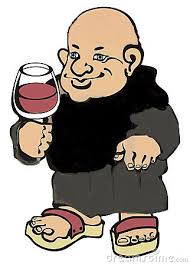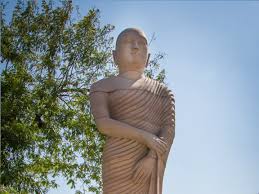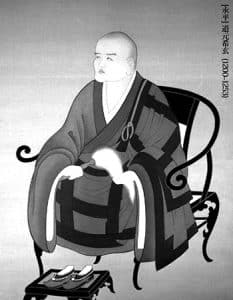Case
Seizei said to Sozan, “Seizei is utterly destitute. Will you give him support?”
Sozan called out, “Seizei!”
Seizei responded, “Yes, sir!”
Sozan said, “You have finished three cups of the finest wine in China, and still you say you have not yet moistened your lips!”
Mumon’s Comment
Seizei pretended to retreat. What was his scheme? Sozan had the eye of Buddha and saw through his opponent’s motive. However, I want to ask you, at what point did Seizei drink wine?
Mumon’s Verse
Poverty like Hantan’s,
Mind like Kou’s;
With no means of livelihood,
He dares to rival the richest.
This case has various interpretations of the conversation itself. Some take the monk who asked the question to be different from Seizei. Some take the wine to be Zen. Some take the monk to be boasting of his spiritual poverty. Some say that when he was called, and answered `yes, Sir’, he showed that he was not really `poor’ because he admitted his own possession of a name and personality. Perhaps the best way to take it is an example of the universal greediness of mankind.
The exchange between Sozan and Seizei is called the ritual of Call and Response. A ritual in which the readiness of the student is tested by the teacher. The first recorded Call and Response is registered between Mahakasyapa and Ananda in the third case of the Denkoroku. Sozan responds with the Call and Response ritual. And Seizei successfully completes the ritual in the same way Ananda did, by responding immediately, in much the same way a mirror immediately reflects the image before it! Without thought. Without preparing. Without the slightest hesitation.
Very little is known about Seizei (Japanese for Qingshui), but from the context of this story, he was clearly a monk of some attainment.
Sozan ((Japanese for Caoshan – 840-901) was an outstanding Zen Master who helped his own master, Tozan, to lay the foundation of the Soto Zen sect. The name Soto is thought to have come from the combination of the So of Sozan and the To of Tozan.
Hantan was a famous Chinese scholar who was appointed to the high post of governor. However, he did not take up his post, but instead took care of his sick mother. He was forced to put his wife and children in a barrow, and go about as a fortune-teller, sleeping under trees or in the lowest lodging houses for more than ten years, until, at last, he got a cottage of his own, but even then did not now the taste of millet. His contentment with honest poverty and his filial devotion made his name renowned.
Kou was a great hero in Chinese history. The commander of a large army, he fought the eventual founder of the Han dynasty, and he won every bottle but the last. Surrounded by the enemy’s forces, he sat in his tent with his beloved mistress Gu, unmoved by the approach of death.
The last two lines of Mumon’s verse are taken from a poem by Sokei, a disciple of Goei, a disciple of Baso.
As for your livelihood, you have not a penny, you say,
But you are fighting with the master about wealth.
***
Sozan, Seizei
We took this title: The victory in the defeat, the richness of the poor. It deals with this phrases of Kodo also like: Zen is to lose everything. The poverty of mind.
You have a story like this. It’s a monk who asks one day to master Sozan. But I don’t think it’s the successor of Tozan. Sozan. Tozan. Bizzare.
Anyway, the monk says: “I’m poor and destitute, I beg you master, please help me, and make me rich.” Sozan says: “Venerable Seizei” (the guy’s name is Seizei it seems). “Yes, master”, Sozan remarked: “Having tasted three cups of best wine of Seigen, do you still say that your lips are not wet?” If we take the system of look into ingredients here, the guy says, “I’m poor and destitute, I beg you, master”.
Again, the monk who goes to the master and ask him to help. It’s again let’s say like Eka goes to Bodhidharma, or like Sozan which goes to Eka. The two guys ask external help. “My mind is not at peace, please pacify it for me.” You know, this is what Eka says to Bodhidharma, and after, you have the successor of Eka who asked the same to Eka. It’s little bit the same situation. Here you have: “Venerable Seizei.” “Yes?”
It’s the situation that you find very often in koans. The guy who asks says the name, the man who answers says: Yes. Or, he turns the head. Here it is: “Seizei?” “Yes?” And then he says: “You had already three cups of best wine, how could you dare to say that your lips are not wet?” What kind of poverty is that? And what kind of richness is that?
The monk goes to master Sozan. Or, monk goes to his master. Nothing new, it’s always the same. “I’m poor and destitute.” What does it mean destitute? The guy, he loses everything. He had something, now he has no longer. Destitute it means that it seems that he was rich before. You have this idea of going the scale downwards. “I’m poor and destitute, please master, make me rich.” What a strange question? What a strange quest? No? Why did we come in the dojo in the first place? “Seizei?” “Yes?” “You already drank three cups of the best wine of Seigen.” It must be Seigen Gyoshi, the successor of Eno. What is the wine of Seigen? It is the ancestor, the first of the Soto family. Eno went to great disciples Seigen and Naigaku. He had two great disciples, Seigen, and Nangaku. From Seigen it comes our family. And Nangaku is Rinzai. The wine of Seigen perhaps is the taste of the Soto family. And the taste of the Soto family is, as you know, exactly the poverty.
“You‟ve tasted the three cups of the fine vine of Seigen, how can you say your lips are not wet?”
Kaijo
Myoken Roshi, kusen
Case Source : sacred-texts
Photo credit : dreamstime




